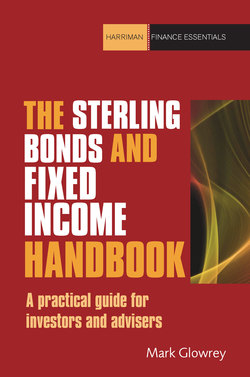Читать книгу The Sterling Bonds and Fixed Income Handbook - Mark Glowrey - Страница 23
На сайте Литреса книга снята с продажи.
Brokers & intermediaries
ОглавлениеThe majority of bonds are dealt on a peer-to-peer basis. That means that one principal (typically an investment bank) will sell a block of bonds on to a customer, perhaps a fund manager or a bank or building society treasury. In the equity market, there is a fairly clear differentiation between the buy side companies (fund managers such as Fidelity, Legal and General etc.) and the market (i.e. brokers and traders grouped around the stock exchange or other trading platforms). Not so the bond market, where many shades of grey exist. Operating within this multi-layered world of banks, proprietary traders, insurance companies, money market funds and investment banks exist numerous bond brokers – often operating in specialised fields. In the manner of a Victorian naturalist, I have attempted to break down the taxonomy as follows:
Investment banks: The top of the tree amongst the numerous bond market intermediaries. The investment banks are the main players and will issue bonds on behalf of the borrowers. The IB’s hold positions in bonds, make secondary markets and sell to brokers and institutional investors. They will also be active in buying bonds and repackaging the debt through the use of swaps, derivatives and other financial engineering.
Bond brokers: These deal in bonds but do not take positions in the bonds. Unlike stockbrokers, who act as agents on pre-agreed commission rates for their client, bond brokers usually take a turn; introducing a margin between buy and sell orders. Usually, bond brokers (sometime known as agency brokers) will sit between the street, as the collection of market makers is known, and the client, who will hopefully be fund manager or other end-investor.
Inter-dealer brokers: As above, but specialised wholesale brokers who work on shifting large blocks of bonds and other instruments between major players (mainly investment banks).
Broker-dealer: A broker who will take some positions, either to facilitate a trade or for speculation.
Stockbrokers: Retail-facing organisations offering private investors access to the financial markets. Stockbrokers vary from low cost online execution-only platforms to high-end discretionary wealth managers. As the name suggests, stockbrokers are typically focused on stocks, and to some degree funds. However, many stockbrokers are now responding to client demand and offering direct trading in bonds. It is through a stockbroker that most private investors will gain access to the markets.
IFAs (Independent Financial Advisors): The typical UK IFA deals with packaged funds and has comparatively little involvement with direct investment into the financial markets.
